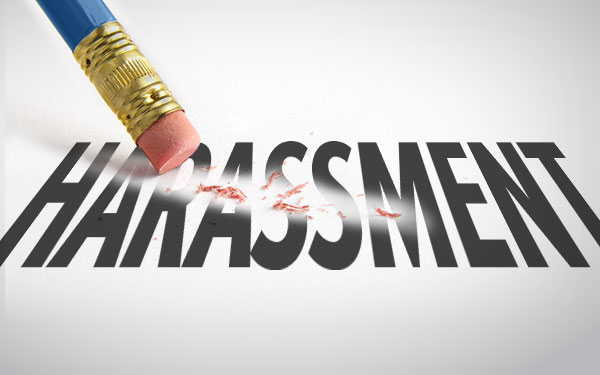7 Types of Harassment in Japan (Identifying Different Forms Of Coercion In Japan And How To Deal With Them)

According to BRIE SCHMIDT; From power struggles to peer pressure, here are seven types of intimidation you’ll encounter in Japan—and some ways to turn the tables.
A few years ago, after seemingly being pigeonholed as an English teacher in job after job, I was excited to finally have my first non-teaching office position in Japan. My excitement waned, however, with each red flag I noticed. I was repeatedly held late at the office, alone with the much older male CEO, while my coworkers were given permission to leave. I was pressured several times into drinking alone with the CEO, while other coworkers never were. And finally, I was inappropriately touched after that CEO had perhaps a few too many drinks.
What is harassment?
Though the red flags I experienced may seem obvious, I refrained from identifying any of these actions as harassment (often shortened to hara in Japanese) until much later. Though the legal definition varies by country, harassment is typically any unwanted, offensive, or threatening behavior that overpowers the victim.
While harassment can commonly happen at work like my experience, harassment in Japan isn’t always workplace-specific, sometimes occurring between family, friends, and even strangers.
The many kinds of hara
While harassment unfortunately exists around the world, there are dozens of types of hara identified in Japanese culture. Here are seven kinds you may come across in Japan:
1. Pawahara (power harassment)
Pawahara is a type of harassment that may happen at work, where a boss or senior employee causes mental, emotional, or physical suffering to a subordinate. Their position of power in the workplace is used as justification to belittle, control, or lash out at their employee. Legally, however, this form of harassment is prohibited.
2. Sekuhara (sexual harassment)
Sexual harassment involves any unwanted behavior or gesture that can be considered sexual in nature. It can happen at work, but it can also occur elsewhere too. For example, in Japan, train chikan (groping) is a well-known issue, creating the need for women-only train cars (though women aren’t the only victims). Sekuhara may also lead to sekahara, or secondary harassment, where victims are blamed or criticized for reporting sexual harassment
3. Jenhara (gender harassment)
Gender harassment involves being harassed or pressured into conforming to gender roles and shaming those who don’t. In Japan, women being expected to cook for their husbands or prepare tea in the office are examples of jenhara.
4. Morahara (moral harassment)
This type of harassment relies on psychological abuse, including gossiping, intentionally excluding, or scolding a coworker or acquaintance. Unlike power harassment, moral harassment can happen between peers or colleagues of similar seniority.
5. Aruhara (alcohol harassment)
Alcohol harassment is where one is pressured to drink, often excessively, and even to the point of being dangerously intoxicated. In this type of harassment, the drinker doesn’t feel that they have the option to not drink. Similarly, an environment where only alcoholic drinks are served may also be considered aruhara.
6. Matahara (maternity harassment)
As you can probably guess by its name, maternity harassment is discrimination or unfair treatment towards mothers and women expecting children. In a country known for its low birth rate, women are often encouraged to either work or have children—but not both. Matahara may include discouraging women from taking leave after giving birth, failing to promote women in the workplace because they have (or may in the future have) a child, or even causing physical harm to a pregnant woman.
7. Yamehara (quitting harassment)
Whether you’ve dealt with harassment in your job or just feel that it’s time to make a career change, you may come to the decision to eventually quit a job in Japan. But if your company punishes you for doing so, that’s yamehara, from the word yameru (to quit) in Japanese. This type of harassment might include guilt-tripping you into staying longer, giving you more troublesome work leading up to your last day, or shaming you for leaving the company. This type of harassment is so common, there are companies available that provide the service of quitting your job for you.
Harassment and Japanese culture
Though there are many kinds of hara in Japan, many of them are labeled as such because of the awareness that these behaviors aren’t acceptable. Still, there are some cultural dynamics and patterns that make certain types of harassment prevalent in Japan.
For one thing, Japan is widely regarded as a homogeneous society where conformity is key. The common saying, “deru kui wa utareru,” or, “The nail that sticks out gets hammered down,” is an accurate summary of how to behave in Japan: if you stick out—or speak up—you’ll be ridiculed for doing so.
This can make it hard for people to feel comfortable coming forward after experiencing harassment. Not only this, but some types of harassment thrive on this conformity. For example, taking maternity leave is considered a betrayal to the rest of the team continuing to work in the office, or failing to follow traditional gender roles may be treated as almost irresponsibly unusual for going against society’s expectations.
Aside from conformity, Japan’s hierarchical relationships can contribute to harassment like pawahara and make it harder to detect. And for those experiencing harassment from an elder or superior, they may struggle to resist due to the power dynamic ingrained in the relationship.
How to deal with harassment in Japan
No matter if you experienced harassment in the workplace or elsewhere, first seek someone trustworthy to talk to. At work, this could be a trusted colleague or someone from your human resources department. You may also want to seek help from someone outside of the situation. This might be a station attendant, a police officer at a nearby koban, or in the case of workplace harassment, an organization such as Hello Work.
If your mental health has taken a hit after experiencing harassment, you may also want to contact TELL for free chat and phone support.
Above all else, know that you’re not alone and you don’t deserve to be harassed. In my office job, I initially convinced myself I was being paranoid and overreacting. For you, listen to your gut, be aware of what constitutes harassment, and remember to be your own advocate.


























